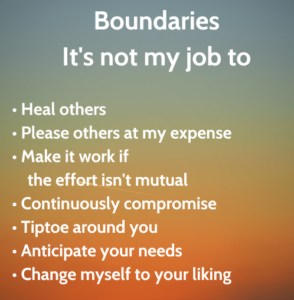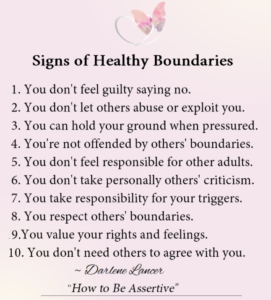 Boundaries are essential for our well-being. They define where we end and others begin. They protect our sense of self, and create a safe space for us to live our lives. Without proper boundaries, we risk feeling overwhelmed, used, or depleted. Setting limits is an act of self-care & self-love, and they help us maintain a healthy sense of self.
Boundaries are essential for our well-being. They define where we end and others begin. They protect our sense of self, and create a safe space for us to live our lives. Without proper boundaries, we risk feeling overwhelmed, used, or depleted. Setting limits is an act of self-care & self-love, and they help us maintain a healthy sense of self.
When we don’t set clear limits, we risk losing our identity and individuality as we try to please others. Boundaries allow us to honor what we need and want, preserving our sense of purpose and values.
Boundaries help us protect our energy levels. Without limits, we can end up giving too much of ourselves and our resources. This leads to burnout, resentment, and even health issues. Setting boundaries conserves our mental, emotional, and physical resources so we can replenish ourselves.
Boundaries are essential for building trust in relationships. When we set clear limits, others know how to treat us with care and respect. But failing to communicate  our needs breeds confusion, hurt feelings, and broken trust. Healthy relationships require honesty about our boundaries.
our needs breeds confusion, hurt feelings, and broken trust. Healthy relationships require honesty about our boundaries.
Boundaries foster autonomy and self-direction. They allow us to pursue our goals and priorities on our own terms, free from unwanted intrusions and obligations. This supports personal growth, productivity, confidence and overall wellbeing.
Setting boundaries is not selfish – it’s essential for living a balanced and fulfilling life. Clear limits define who we are, conserve our energy, strengthen our connections, and support our growth. With proper boundaries, we can show up as our best and most authentic selves.
Four recommendations for setting boundaries:
- BECOME SELF-AWARE
Notice, observe and explore your emotions, and remember that they express themselves as bodily sensations. Allow yourself to feel them, and take them as wise messages from the most inner part of you. They are about what you need.Notice your triggers. They may be telling you something about your beliefs, needs and struggles. Reflect on how they impact your relationships.Notice your body language ( eye-contact, relaxed face, standing up straight) as it also communicates how you feel.When you become self-aware, you will be able to respond consciously instead of reacting from a place of unconscious hurt.
- COMMUNICATE CLEARLY
It’s important to first understand and gain clarity on what boundaries you need to set in order to be able to communicate them clearly.Be straightforward & consistent in your message and do not change it without explaining why. Talk in a calm tone of voice. Avoid yelling or whispering. Express what you want or need, and refrain from judging the other. Avoid words like “Always” or “Never.” They tend to exaggerate and your message becomes diluted. Make clear requests instead of asking for permission. Using “I” statements is the best way to go about it. You can use phrases like:
* When (this)………happens, I feel……….. Would it be possible for you to……….?
* Instead of …………….I would like you to ………. Do you think you could do that?
- BE RESPECTFUL, COURTEOUS & CURIOUSRemember to respect other people’s boundaries by being thoughtful, respectful and not judging them.Listen carefully. Be curious about motives. They may come from a well intentioned place. Curiosity is a superhuman tool. It allows us to understand other people’s perspectives without assumptions rooted in our own limiting beliefs. Openness & curiosity are the two tools that connect us to others.
- BE ASSERTIVEWhen setting your boundaries, or when confronting someone about a conflict or challenge, you want to be assertive. Assertiveness is the right balance between being passive and aggressive. Being assertive makes sure that your feelings are clearly communicated, but it also avoids belittling or dismissing other people’s thoughts or opinions. When you are assertive, you are expressing yourself with confidence & clarity and you are in control. It can help you strengthen relationships, solve problems, and reduce negative emotions.
So this week, explore the boundaries you set in your life. And if someone is triggered because you are setting boundaries, it is actually more evidence that the boundary you are setting is really needed.
Let me know what you think in the comments.

Leave a Reply